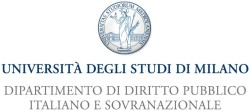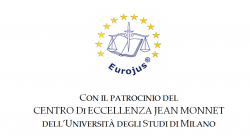Call for papers “The reform of the rules of procedure of the EU Courts”
The reform of the rules of procedure of the EU Courts
La riforma delle regole processuali del giudice dell’Unione europea
La réforme des règles de procédure du juge de l’Union européenne
University of Milan
Department of Italian and Supranational Public Law – International and EU Law Section
European Union Law Chairs
16 December 2016 – Milan
CALL FOR PAPERS
1. Conference contents and targets
While the European Union is called upon to tackle unprecedented crises and challenges (from economic shortfalls to immigration, from the possible exit of some Member States to the preservation of the Schengen acquis), its Court of Justice is involved in a still ongoing reform process, whose aim is to provide a more effective implementation of EU Law and a better protection of EU citizens’ rights.
The rules of procedure of EU Courts have been recently object of a major reform, aimed at enhancing the parties’ right of defense through a more efficient and less time-consuming process.
One year after the entry into force of the new Rules of Procedure (hereinafter, RoP) of the General Court (1 July 2015) and almost four years after the successful amendment of the RoP of the Court of Justice (1 November 2012), it seems appropriate to start an in-depth reflection on the actual extent and efficacy of this new legal framework. Moreover, the structure of the EU judicial institution itself is currently under a process of reform whose impact and effects on EU litigation are hard to predict. The Regulation (EU, Euratom) 2015/2422 of 16 December 2015, while setting the steps for doubling the General Court’s judges, has not made clear the destiny of the Civil Service Tribunal and it has sketched a new judicial architecture that deeply transforms (or even distorts) the EU system of judicial protection arising from the Nice Treaty.
2. Preferred topics: some examples
The scholars with a focus on litigation before EU Courts and on European integration in general are invited to present written contributions to launch the debate on the future of the EU judicial architecture. By way of example and without discouraging other ideas, the following topics are suggested:.
1) The specialization of EU judicial bodies. The reform sketched by Regulation (EU, Euratom) n° 2422 of 16 December 2015 – while leaving primary law unaltered – seems to imply the disappearance of specialized courts, which can be established, pursuant to Article 257 TFEU, to hear and determine at first instance certain classes of action or proceeding brought in specific areas. How can the new architecture of the EU judicial system, which will then only consist of bodies with a quite generalist vocation, respond to the need of specialization that characterizes certain areas of EU law?
2) The language of EU litigation. Multilingualism has always represented for the Court of Justice both a (expensive) challenge and an added value. In the perspective of respecting the
principle of reasonable duration of the proceedings before the EU Courts, it seems appropriate to reflect whether the national identities and the individuals’ rights of defence can be protected by other means than multilingualism.
3) The new rules on the oral part of the proceduree. The goal of ensuring a more effective procedure in terms of duration and the experience made in the area of intellectual property have brought to an amendment of the RoP of the General Court, allowing this latter, under certain circumstances, to settle the dispute without a hearing. Since 2012, the possibility for the Court of Justice to settle a case without a hearing has been widened too; the fact that this possibility applies also to preliminary ruling proceedings has nonetheless raised some criticism. It seems worth reflecting whether these innovations do actually enhance the celerity of EU litigation. If so, one should also consider whether this purpose has been correctly balanced with the protection of the right of defence, or whether it may hinder the ‘attractiveness’ of lodging an appeal before EU Courts, which is a fundamental vehicle for integration.
4) The role of parties other than the main parties in the proceedings before EU Courts. The recent reform of the RoPs of the General Court and of the Court of Justice has introduced some innovations with regard to the intervention and the participation in preliminary ruling proceedings. It seems appropriate to develop a wide-ranging reflection on the effectiveness of such a reform. In particular, it seems interesting to assess its compliance with third parties’ rights of defence and to focus on the contribution of the participants in the preliminary ruling proceedings (although they are not ‘privileged’ interlocutors of the Court of Justice) to the correct interpretation of EU law.
5) The different procedures for dealing with cases according to the reasonable duration. Cases before the General Court and the Court of Justice can be governed by different rules according to choices made on the basis of the need to comply with the principle of the reasonable duration of proceedings, whose breach can lead to the non-contractual liability of the EU. It seems appropriate to verify whether the various possibilities offered by the rules of procedure make it possible to deal with cases in an effective and efficient manner
6) Confidentiality in the proceedings before the General Court. The new Article 105 of the RoP of the General Court aims at filling a regulatory gap by conferring a specific treatment to documents or information concerning the security of the EU or of its Member States or the conduct of their international relations. The new legal framework, which the litigation concerning the so called restrictive measures has proved necessary, draws the attention to a sensitive crossroads between the protection of individuals’ rights and the pursuit of the general interests of the Union and of its Member States, setting out an opposition and a need of balance which is not something new in the European integration process.
7) The special framework for litigation in the area of intellectual property. Cases concerning intellectual property rights have characteristics that justify the choice of distinguishing them from direct actions concerning all other fields. Moreover, such cases constitute a “massive litigation” in a highly specialised sector. An analysis of these rules provides an opportunity not only to check their effectiveness, but also to develop a broader reflection on the different procedures for dealing with cases in this area, also in the light of a possible future entry into force of the agreement on a Unified Patent Court.
The topics indicated above are a selection of the possible research areas in the context of the reform of the rules of procedure, as well as of the Court of Justice itself. However, proposals on other topics, relating to the reform of EU rules of procedure and of the EU Court of Justice as such, can also be submitted. An approach capable of highlighting the different perspectives concerning the Court and the General Court (and, if necessary, the Civil Service Tribunal) will be appreciated.
3. Organisational details
The Authors may propose their papers by sending an abstract (about 1,500 words) which outlines the main interesting aspects and areas of discussion relating to the chosen topic.
The abstracts, which may be drawn up in Italian, English or French, shall be sent by 10 August 2016, together with a curriculum vitae of the Author, to the following email address: processoue.convegnounimi@eurojus.it. The results of the selection will be communicated by 30 August 2016. The final version of the paper (between 7,000 and 10,000 words) shall be submitted by 7 November 2016 and will be presented and discussed at the Conference in the language chosen by the Author. The authors of the selected papers will obtain a refund of the travel and subsistence expenses.


